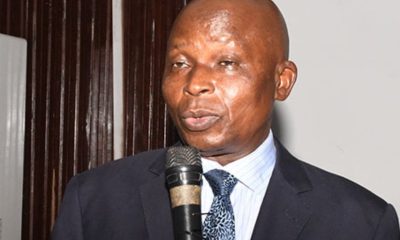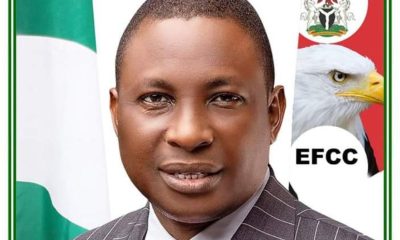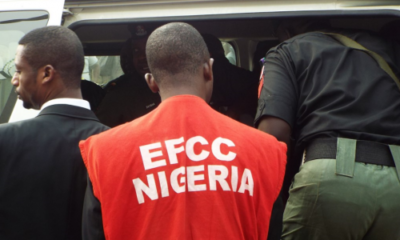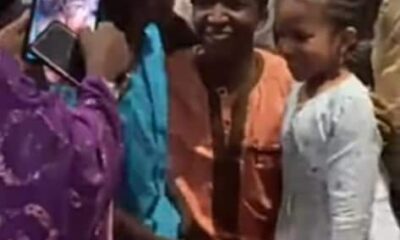Headline
EFCC Uncovers N37B Fraud In Humanitarian Ministry, Indicts Sadiya Umar-Farouk
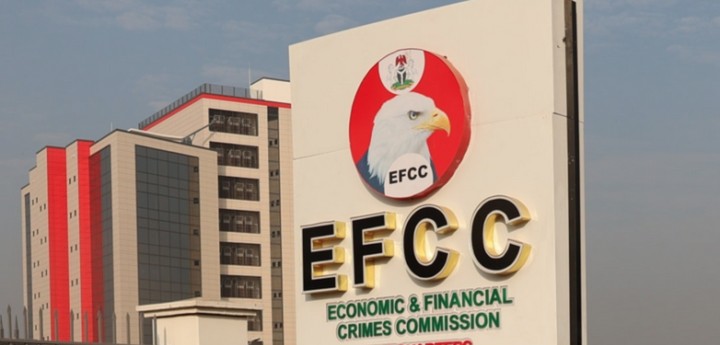
The Economic and Financial Crimes Commission has uncovered a total sum of N37,170,855,753.44 allegedly laundered in the Ministry of Humanitarian Affairs under former minister Sadiya Umar-Farouk.
Details of the ongoing probe exclusively obtained by Sunday PUNCH revealed that the money was transferred from the Federal Government’s coffers and sent to 38 different bank accounts domiciled in five legacy commercial banks belonging to or connected with a contractor, James Okwete.
Following receipt of the funds, Okwete allegedly transferred N6,746,034,000.00 to Bureau De Change Operators, withdrew N540,000,000.00 in cash, purchased luxury cars with N288,348,600.00, and bought luxury houses in Abuja and Enugu State with N2,195,115,000.00.
Fifty-three companies were allegedly traced to Okwete, who was also said to have used 47 of the companies to lift Federal Government contracts amounting to N27,423,824,339.86. He is also linked with 143 bank accounts in 12 commercial banks in which 134 accounts are corporate accounts linked to different companies.
Checks by our correspondent with the Corporate Affairs Commission revealed that Okwete is a director in only 11 of the 53 companies, while the remaining 42 companies’ accounts are only linked to his Bank Verification Number as a signatory to the accounts.
Sunday PUNCH reports that the Federal Ministry of Humanitarian Affairs currently serves as the parent ministry to eight agencies, including the National Social Investment Office, the Office of the Senior Special Assistant to the President on Sustainable Development Goals, and the National Commission for Refugees, Migrants, and Internationally Displaced Persons, among others.
Umar-Farouq was the pioneer Minister of Humanitarian Affairs, Disaster Management and Social Development. She was appointed by former President Muhammadu Buhari in July 2019 as the youngest cabinet member.
Her work with Buhari dates back to his days as the leader and presidential candidate of the defunct Congress for Progressive Change when she was the national treasurer of the party and later the national treasurer of the All Progressives Congress.
She was later appointed minister in 2019 by President Buhari.
The EFCC document revealed, “Between 2018 and 2023, the subject (Okwete) received the sum of N37,170,855,753.44 from the coffers of the Federal Government linked to the Ministry of Humanitarian Affairs, Disaster Management and Social Development.
“The monies were sent to 38 bank accounts domiciled in five legacy commercial banks. The suspect transferred N6,746,034,000.00 to Bureau De Change Operators, N540,000,000.00 withdrawn in cash, N288,348,600.00 used to purchase cars, and used N2,195,115,000.00 to purchase choice properties within Abuja and Enugu State.
“Fifty-three companies were traced to the suspect. He used 47 of the companies to lift Federal Government contracts amounting to N27,423,824,339.86. Okwete is associated with 143 bank accounts in 12 commercial banks in which 134 of the 143 accounts are corporate accounts linked to different companies.”
In 2020, the Independent Corrupt Practices and Other Related Offences Commission said it uncovered N2.67bn meant for the ministry’s school feeding programme in private bank accounts.
The former ICPC Chairman, Prof Bolaji Owasanoye, disclosed that the commission unravelled N2.67bn in personal accounts, being payment made to some federal colleges for school feeding during the COVID-19 lockdown in 2020.
Other discoveries by the ICPC include 18 buildings, 12 business premises and 25 plots of land. Owasanoye said under the Open Treasury Portal review carried out between January and August 15, 2020, of the 268 Ministries, Departments and Agendas, 72 had cumulative infractions of N90m.
The former ICPC chairman argued that the money was paid when children were not in school.
Despite requests by the Socio-Economic Rights and Accountability Project to Umar-Farouq to publish details and names of the suspects, the former minister failed to reveal their names.
Reacting to this, SERAP had written on its official Facebook page, “Following the disclosure by the ICPC that N2.67bn meant for school feeding during the COVID-19 lockdown ended up in private bank accounts, we’re calling on the Minister of Humanitarian Affairs, Disaster Management and Social Development of Nigeria, Sadiya Umar-Farouq, to immediately publish details of those suspected to be responsible, or face legal action.
“If the names are not immediately published, we’ll issue a freedom of information request to ensure that those involved are named and shamed.
“We’ll also pursue appropriate legal actions to hold suspected perpetrators to account, in the public interest.
“Diverting funds meant to feed school children (who are already disproportionately affected by corruption), especially during COVID-19, is a blatant violation of the rights to education, health, and dignity, as well as the government’s own COVID-19 transparency frameworks.
Corruption in school feeding increases distrust in the government. The Federal Government must ensure that transparency and accountability measures are fundamental to all school feeding and other initiatives in the context of COVID-19, to ensure the children receive the support they need.”
When contacted over the development, the spokesperson for the EFCC, Dele Oyewale, neither confirmed nor denied the story.
Oyewale simply said, “No comments on that.”
Headline
EFCC bars dollar transactions, orders embassies to charge in naira

The Economic and Financial Crimes Commission has barred foreign missions based in Nigeria from transacting in foreign currencies and mandated them to use Naira in their financial businesses.
The EFCC has also mandated Nigerian foreign missions domiciled abroad to accept Naira in their financial businesses.
The anti-graft agency said the move is to tackle the dollarisation of the Nigerian economy and the degradation of the naira
The Commission, therefore, asked the government to stop foreign missions in Nigeria from charging visa and other consular services in foreign denominations.
The EFCC gave the advisory in a letter to the Minister of Foreign Affairs, Amb. Yusuf Tuggar, for onward transmission to all foreign missions in the country.
In the letter, the EFCC said it issued the advisory because the practice of paying for consular services in dollars was in conflict with extant laws and financial regulations in Nigeria.
In a letter dated April 5, 2024, which was addressed to the Minister of Foreign Affairs, Ambassador Yusuf Tuggar, titled: “EFCC Advisory to Foreign Missions against Invoicing in US Dollar,” the EFCC Chairman, Ola Olukoyede expressed dismay over the invoicing of consular services in Nigeria by foreign missions in dollars.
The EFCC cited Section 20(1) of the Central Bank of Nigeria Act, 2007, which makes currencies issued by the apex bank the only legal tender in Nigeria.
The letter read, “I present to you the compliments of the Economic and Financial Crimes Commission, and wish to notify you about the commission’s observation, with dismay, regarding the unhealthy practice by some foreign missions to invoice consular services to Nigerians and other foreign nationals in the country in United States dollar ($).
“It states that ‘the currency notes issued by the Bank shall be the legal tender in Nigeria on their face value for the payment of any amount’.
“This presupposes that any transaction in currencies other than the naira anywhere in Nigeria contravenes the law and is, therefore, illegal.”
The commission further stated that the rejection of the naira for consular services in Nigeria by certain missions, along with non-compliance with foreign exchange regulations in determining service costs, is not just unlawful but also undermines the nation’s sovereignty embodied in its official currency.
The letter continues: “This trend can no longer be tolerated, especially in a volatile economic environment where the country’s macroeconomic policies are constantly under attack by all manner of state and non-state actors.
“In light of the above, you may wish to convey the commission’s displeasure to all missions in Nigeria and restate Nigeria’s desire for their operations not to conflict with extant laws and regulations in the country.”
Diplomatic sources said yesterday, May 10, that some embassies were wondering whether the EFCC’s advisory represented the position of the Federal Government.
Headline
Prince Harry visits sick Nigerian soldiers in Kaduna

Prince Harry and his team visited the 44 Nigerian Army Reference Hospital in Kaduna to interact with wounded soldiers who are receiving treatment.
The Duke of Sussex is in Nigeria with his wife to champion the Invictus Games, which Harry founded to aid the rehabilitation of wounded and sick servicemembers and veterans.
Nigeria joined the Invictus Community of Nations in 2022 becoming the first African country to join.
Prince Harry’s visit to Kaduna came 68 years after his late grandmother Queen Elizabeth II visited the state during the time of the late Premier of Northern Region Sir Ahmadu Bello.




-

 Headline5 days ago
Headline5 days agoSuspend cybersecurity levy– Reps to CBN
-

 Business5 days ago
Business5 days agoNigeria needs over $2bn to revive Ajaokuta Steel Plant, says Minister
-

 Headline3 days ago
Headline3 days agoPrince Harry visits sick Nigerian soldiers in Kaduna
-

 Entertainment3 days ago
Entertainment3 days agoAMVCA Cultural Day: BBNaija’s Neo, Venita win Best Dressed Male, Female
-

 Metro3 days ago
Metro3 days agoEx-Sports Minister laments after hospital neglected him for hours over N80000 deposit
-

 Headline5 days ago
Headline5 days agoTinubu resumes work after foreign trip
-

 News5 days ago
News5 days agoShan George’s money returned to Zenith Bank account



